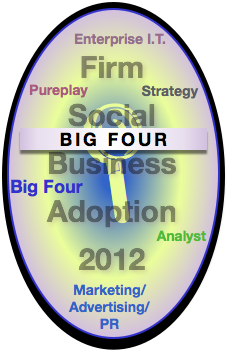 [UPDATED] The Big Four accountancies have been rebuilding their advisory practices for the past several years, and social business transformation fits with their core competencies in important ways. Like Strategy firms, they have been watching adoption and producing thought leadership on various aspects of social technologies’ relevance to business. Their approach also resembles that of strategy firms in that they have relatively low evidence of social business practice. [UPDATED] The Big Four accountancies have been rebuilding their advisory practices for the past several years, and social business transformation fits with their core competencies in important ways. Like Strategy firms, they have been watching adoption and producing thought leadership on various aspects of social technologies’ relevance to business. Their approach also resembles that of strategy firms in that they have relatively low evidence of social business practice.
Big Four firms are well positioned to evolve into social business consultancies because they have core competencies in business strategy and business process transformation. However, they will be challenged by their relative lack of core communications skills and awareness of “soft” social, people and behavioral knowledge.
Deloitte has been an early adopter of social business as a concept, perhaps because it did not shed its consulting practice in the early 2000s as all others did. PwC acquired boutique social business consultancy Ant’s Eye View in 2012, which shows its intention to integrate social business more deeply into its Customer Impact practice.
[…]
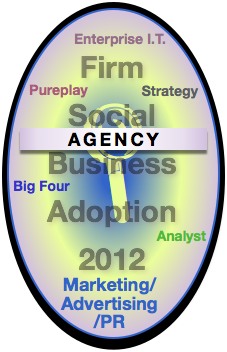 [UPDATED] Marketing, advertising and public relations (MAP) agencies have comprised the largest share of the “social” advisory and execution firms for many years. Most of the other advisory firms are relative late entrants, with the exception of some Analyst and Enterprise I.T. firms. Communication forms the core of social technologies, and MAP agencies have been pivotal in leading the growth of social media activity in their clients, many of the largest brands in the world. [UPDATED] Marketing, advertising and public relations (MAP) agencies have comprised the largest share of the “social” advisory and execution firms for many years. Most of the other advisory firms are relative late entrants, with the exception of some Analyst and Enterprise I.T. firms. Communication forms the core of social technologies, and MAP agencies have been pivotal in leading the growth of social media activity in their clients, many of the largest brands in the world.
However, this research survey argues that, although social media will remain an important portion of the total economic value produced by using social technologies, it will devolve into a minority portion. Collaboration and pervasive innovation will be the majority, which will require enterprise business process transformation. MAP agencies lack competencies in management consulting and enterprise transformation, so they are in an ambiguous situation, being the leaders in social media, a shrinking market in the medium to long term. This report shows how agencies can navigate these rapids and how their clients might best partner with them […]
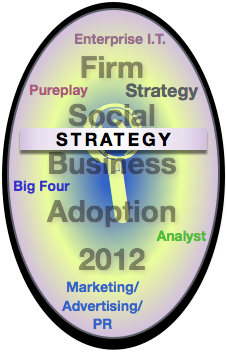 [UPDATED] Strategy firms are the most trusted names sought by CEOs and boards of directors who are reevaluating their companies’ identities, strategies and operations. Strategy firms have been making measured investments in social business over the last few years. Their knowledge of enterprise transformation is deep and broad, and they all have proprietary methodologies for most aspects of the strategy and transformation life cycle. They have deep and broad expertise in market analysis, competitive analysis corporate core competency analysis and virtually all aspects of operations. Many firms have large business transformation practices that explicitly guide clients through profound redefinition and change. [UPDATED] Strategy firms are the most trusted names sought by CEOs and boards of directors who are reevaluating their companies’ identities, strategies and operations. Strategy firms have been making measured investments in social business over the last few years. Their knowledge of enterprise transformation is deep and broad, and they all have proprietary methodologies for most aspects of the strategy and transformation life cycle. They have deep and broad expertise in market analysis, competitive analysis corporate core competency analysis and virtually all aspects of operations. Many firms have large business transformation practices that explicitly guide clients through profound redefinition and change.
Strategy firms have extensive core competencies that could enable them to offer social business strategy services. In addition, Strategy firms are significant producers of thought leadership relevant to corporate and business strategy as well as operations. Most firms field high quality management journals whose papers are written by their consultants. Many have research boutiques or even full-fledged businesses for research and thought leadership. However, they are challenged by very conservative […]
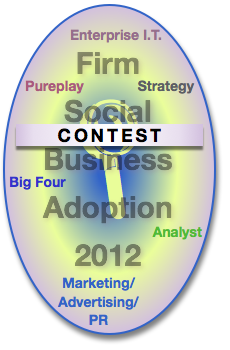 Advisory and Services Firm Social Business Adoption 2012 is publishing as individual Executive Summaries of firm category reports. These discuss relative scores of firms in each category, but they don’t disclose scores themselves. This enables us to have some fun. You can guess the highest scores in several categories and win valuable prizes! Advisory and Services Firm Social Business Adoption 2012 is publishing as individual Executive Summaries of firm category reports. These discuss relative scores of firms in each category, but they don’t disclose scores themselves. This enables us to have some fun. You can guess the highest scores in several categories and win valuable prizes!
Contest Rules
To be eligible for 1st, 2nd or 3rd prizes, all you need do is respond to four questions via the embedded survey below. You could win an Extended Analysis report of any firm in this Research Survey, or even commission your own Extended Analysis report! For five minutes of your time.
I will award prizes two days after the last Executive Summary publishes (see the Research Survey microsite for dates). However, the first person who responds with the correct answer wins that prize. This introduces some risk for people who just wait until the end! You should also know that I reserve the right to change any of the rules or prizes without notice except on this […]
![Social Media Upgrade [Social Business Team Building] case1](http://rollyson.net/wp-content/uploads/2013/04/sbtb1.png) [Updated] The Social Media Upgrade applies to most consumer-oriented brands that have been outsourcing much of their social media work to agencies. In 2013, digital marketing and brand executives are thinking about building their internal teams to provide more continuity and scale. [Updated] The Social Media Upgrade applies to most consumer-oriented brands that have been outsourcing much of their social media work to agencies. In 2013, digital marketing and brand executives are thinking about building their internal teams to provide more continuity and scale.
Social Media Upgrade is the first of the five-part social business team building series The series describes team building in the context of various scenarios in which firms build social business capability, step by step, while investing wisely. Social Business Strategy Use Cases outlines and compares all five use cases while Social Business Team Building gives general guidance for how to create social business teams as well as recommendations for what characteristics leaders have, so I recommend reading them, too.
[…]
 It is exciting to see widening recognition that brand survival depends on improving the lives of customers, not merely “pushing product” as they are accustomed to doing. In the latest example, Business Should Focus on Sociality, Not Social “Media”, Umair Haque offered a case for the end of social media and the disruption of many Industrial Economy structures, namely the social contract. It is exciting to see widening recognition that brand survival depends on improving the lives of customers, not merely “pushing product” as they are accustomed to doing. In the latest example, Business Should Focus on Sociality, Not Social “Media”, Umair Haque offered a case for the end of social media and the disruption of many Industrial Economy structures, namely the social contract.
As regular readers well know, I agree with Haque’s key thesis, that brands need to jettison their legacy focus on products/services in favor of dedicating themselves to helping users achieve outcomes while using their products. I have often written that humans and their organizations will have to adopt a more collaborative and responsible attitude and approach in general. However, I don’t agree with him that there’s only one way to do “sociality” as he implies by his assertion that brands have an “existential responsibility” to “the art of living.” Here I’ll explain the differences, which will help brand stewards understand the nuances of brands’ disruption.
[…]
 Branch disruption enables unusual opportunity for bank executives who consider transforming their relationships with clients. More generally, retail banking provides an excellent example of an Industrial Economy industry whose services are facing commoditization and weakening profits due to the waning of the Productized Channel of Value. In 2013, bank branch networks are under intense scrutiny because they are expensive, and client visits have been falling steadily for several years as e-banking and m-banking adoption have accelerated. Astute banks will use branches to transform their client relationships by leveraging the Social Channel. Here’s how they will do it. Branch disruption enables unusual opportunity for bank executives who consider transforming their relationships with clients. More generally, retail banking provides an excellent example of an Industrial Economy industry whose services are facing commoditization and weakening profits due to the waning of the Productized Channel of Value. In 2013, bank branch networks are under intense scrutiny because they are expensive, and client visits have been falling steadily for several years as e-banking and m-banking adoption have accelerated. Astute banks will use branches to transform their client relationships by leveraging the Social Channel. Here’s how they will do it.
[…]
Social Channel Three: Using the Social Channel to Defend Native Markets and Penetrate Foreign Markets
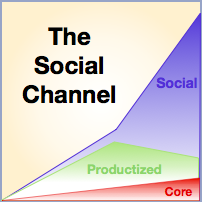 The global Social Channel will reintroduce “home court advantage” to national brands because those that use social business to compete globally by collaborating with users will have the cultural advantage; “foreign” firms may have better product features for the money, but they will not match home brands’ cultural fluency. Personalized service and attention are culturally specific, and deep cultural fluency directly correlates to intimacy. However, brands can only develop the home court advantage by practicing social business at an advanced level. Most have a long way to go and, meanwhile, they will get hammered when they persist in competing on product features in the Productized Channel of Value. The global Social Channel will reintroduce “home court advantage” to national brands because those that use social business to compete globally by collaborating with users will have the cultural advantage; “foreign” firms may have better product features for the money, but they will not match home brands’ cultural fluency. Personalized service and attention are culturally specific, and deep cultural fluency directly correlates to intimacy. However, brands can only develop the home court advantage by practicing social business at an advanced level. Most have a long way to go and, meanwhile, they will get hammered when they persist in competing on product features in the Productized Channel of Value.
The blade cuts both ways: the home court advantage will make exporting to emerging markets much more difficult in the years ahead. The Social Channel will raise the bar because users in all markets will increasingly expect brands to relate to them and to solicit their input and advice. Brands will have to invest significantly in developing in-market social […]
How Marketers Are Pushing the Wrong Button on Mobile

Mobile advertising is flawed because it interrupts. CMOs’ continued use of such outmoded marketing tactics isn’t pretty, like bursting market bubbles or parties at which one has stayed too long. Screen-hogging banners or tricky apps are unnecessary for those who understand the mobile experience and how to add value; however, they are very effective for alienating clients and customers. As Stan Rapp puts it, “Don’t do things to people (do things with them).” In the interest of doing mobile right, I’ll juxtapose the mobile experience with advertising to show how inappropriate much of it is before suggesting how marketers and brands can add value and avoid destroying trust.
“Everybody hates digital ads.” This is a refrain I’ve heard forever, and I have never heard anyone say that they like them. People don’t even like big screen […]
 I have written often about various facets of social business disruption, which usually causes organizations angst because they have to learn to change how they do things. On a happier note, nonprofits and NGOs, long accustomed to being (relatively) disadvantaged do-gooders grateful for commercial bodies’ largesse, actually have more of an advantage in social business than commercial firms (“brands”). I have written often about various facets of social business disruption, which usually causes organizations angst because they have to learn to change how they do things. On a happier note, nonprofits and NGOs, long accustomed to being (relatively) disadvantaged do-gooders grateful for commercial bodies’ largesse, actually have more of an advantage in social business than commercial firms (“brands”).
In this context, government usually lies between nonprofits and brands because it’s not commercially focused (advantage), but it rarely considers individuals in meaningful ways (disadvantage). Here I’ll lay out the rationale for these claims before giving some practical pointers for unlocking social business potential by understanding the social good of your business. Brands and governments, you can learn from this, too.
[…]
|
|
 [UPDATED] The Big Four accountancies have been rebuilding their advisory practices for the past several years, and social business transformation fits with their core competencies in important ways. Like Strategy firms, they have been watching adoption and producing thought leadership on various aspects of social technologies’ relevance to business. Their approach also resembles that of strategy firms in that they have relatively low evidence of social business practice.
[UPDATED] The Big Four accountancies have been rebuilding their advisory practices for the past several years, and social business transformation fits with their core competencies in important ways. Like Strategy firms, they have been watching adoption and producing thought leadership on various aspects of social technologies’ relevance to business. Their approach also resembles that of strategy firms in that they have relatively low evidence of social business practice.
 [UPDATED] Marketing, advertising and public relations (MAP) agencies have comprised the largest share of the “social” advisory and execution firms for many years. Most of the other advisory firms are relative late entrants, with the exception of some Analyst and Enterprise I.T. firms. Communication forms the core of social technologies, and MAP agencies have been pivotal in leading the growth of social media activity in their clients, many of the largest brands in the world.
[UPDATED] Marketing, advertising and public relations (MAP) agencies have comprised the largest share of the “social” advisory and execution firms for many years. Most of the other advisory firms are relative late entrants, with the exception of some Analyst and Enterprise I.T. firms. Communication forms the core of social technologies, and MAP agencies have been pivotal in leading the growth of social media activity in their clients, many of the largest brands in the world. [UPDATED] Strategy firms are the most trusted names sought by CEOs and boards of directors who are reevaluating their companies’ identities, strategies and operations. Strategy firms have been making measured investments in social business over the last few years. Their knowledge of enterprise transformation is deep and broad, and they all have proprietary methodologies for most aspects of the strategy and transformation life cycle. They have deep and broad expertise in market analysis, competitive analysis corporate core competency analysis and virtually all aspects of operations. Many firms have large business transformation practices that explicitly guide clients through profound redefinition and change.
[UPDATED] Strategy firms are the most trusted names sought by CEOs and boards of directors who are reevaluating their companies’ identities, strategies and operations. Strategy firms have been making measured investments in social business over the last few years. Their knowledge of enterprise transformation is deep and broad, and they all have proprietary methodologies for most aspects of the strategy and transformation life cycle. They have deep and broad expertise in market analysis, competitive analysis corporate core competency analysis and virtually all aspects of operations. Many firms have large business transformation practices that explicitly guide clients through profound redefinition and change. Advisory and Services Firm Social Business Adoption 2012 is publishing as individual Executive Summaries of firm category reports. These discuss relative scores of firms in each category, but they don’t disclose scores themselves. This enables us to have some fun. You can guess the highest scores in several categories and win valuable prizes!
Advisory and Services Firm Social Business Adoption 2012 is publishing as individual Executive Summaries of firm category reports. These discuss relative scores of firms in each category, but they don’t disclose scores themselves. This enables us to have some fun. You can guess the highest scores in several categories and win valuable prizes!![Social Media Upgrade [Social Business Team Building] case1](http://rollyson.net/wp-content/uploads/2013/04/sbtb1.png) [Updated] The Social Media Upgrade applies to most consumer-oriented brands that have been outsourcing much of their social media work to agencies. In 2013, digital marketing and brand executives are thinking about building their internal teams to provide more continuity and scale.
[Updated] The Social Media Upgrade applies to most consumer-oriented brands that have been outsourcing much of their social media work to agencies. In 2013, digital marketing and brand executives are thinking about building their internal teams to provide more continuity and scale. It is exciting to see widening recognition that brand survival depends on improving the lives of customers, not merely “pushing product” as they are accustomed to doing. In the latest example, Business Should Focus on Sociality, Not Social “Media”, Umair Haque offered a case for the end of social media and the disruption of many Industrial Economy structures, namely the social contract.
It is exciting to see widening recognition that brand survival depends on improving the lives of customers, not merely “pushing product” as they are accustomed to doing. In the latest example, Business Should Focus on Sociality, Not Social “Media”, Umair Haque offered a case for the end of social media and the disruption of many Industrial Economy structures, namely the social contract. Branch disruption enables unusual opportunity for bank executives who consider transforming their relationships with clients. More generally, retail banking provides an excellent example of an Industrial Economy industry whose services are facing commoditization and weakening profits due to the waning of the Productized Channel of Value. In 2013, bank branch networks are under intense scrutiny because they are expensive, and client visits have been falling steadily for several years as e-banking and m-banking adoption have accelerated. Astute banks will use branches to transform their client relationships by leveraging the Social Channel. Here’s how they will do it.
Branch disruption enables unusual opportunity for bank executives who consider transforming their relationships with clients. More generally, retail banking provides an excellent example of an Industrial Economy industry whose services are facing commoditization and weakening profits due to the waning of the Productized Channel of Value. In 2013, bank branch networks are under intense scrutiny because they are expensive, and client visits have been falling steadily for several years as e-banking and m-banking adoption have accelerated. Astute banks will use branches to transform their client relationships by leveraging the Social Channel. Here’s how they will do it. The global Social Channel will reintroduce “home court advantage” to national brands because those that use social business to compete globally by collaborating with users will have the cultural advantage; “foreign” firms may have better product features for the money, but they will not match home brands’ cultural fluency. Personalized service and attention are culturally specific, and deep cultural fluency directly correlates to intimacy. However, brands can only develop the home court advantage by practicing social business at an advanced level. Most have a long way to go and, meanwhile, they will get hammered when they persist in competing on product features in the Productized Channel of Value.
The global Social Channel will reintroduce “home court advantage” to national brands because those that use social business to compete globally by collaborating with users will have the cultural advantage; “foreign” firms may have better product features for the money, but they will not match home brands’ cultural fluency. Personalized service and attention are culturally specific, and deep cultural fluency directly correlates to intimacy. However, brands can only develop the home court advantage by practicing social business at an advanced level. Most have a long way to go and, meanwhile, they will get hammered when they persist in competing on product features in the Productized Channel of Value.
 I have written often about various facets of social business disruption, which usually causes organizations angst because they have to learn to change how they do things. On a happier note, nonprofits and NGOs, long accustomed to being (relatively) disadvantaged do-gooders grateful for commercial bodies’ largesse, actually have more of an advantage in social business than commercial firms (“brands”).
I have written often about various facets of social business disruption, which usually causes organizations angst because they have to learn to change how they do things. On a happier note, nonprofits and NGOs, long accustomed to being (relatively) disadvantaged do-gooders grateful for commercial bodies’ largesse, actually have more of an advantage in social business than commercial firms (“brands”).